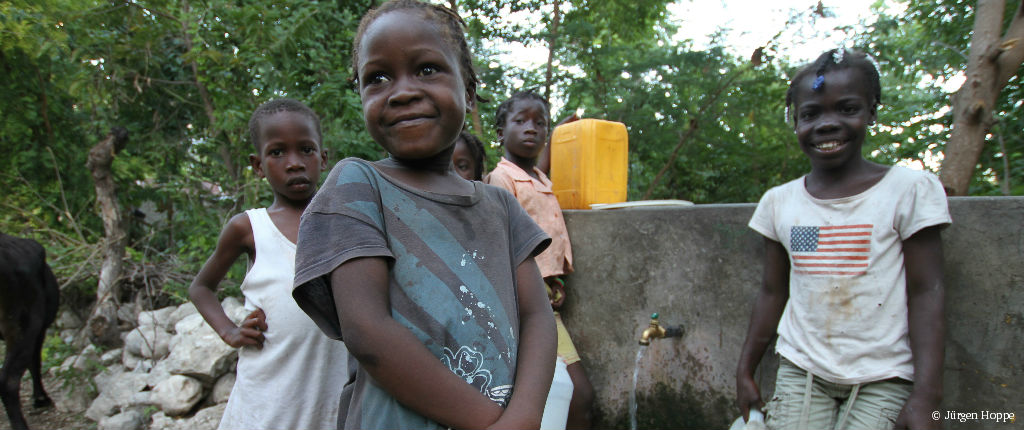
Fresh water for a sustainable future
Even in the midst of the profound poverty and extreme vulnerability of Haiti, Belle Anse – in the south west of the country – stands out because of its extreme level of need. Over 20,000 people out of the district’s population of 70,000 have difficulty getting a minimal amount of even the most basic food to eat. Most people live on less than one dollar per day with the help of subsistence farming and charcoal production, and the outlying and hilly region is shockingly underdeveloped. At present, the worst drought in 35 years, and the effects of the El Niño phenomenon are making matters worse. Poor irrigation means that almost all of Haiti’s farmland is strongly dependent on the rain – causing the country to lose around half of its harvest, and pushing food prices up. Poor sanitation, diarrhea, and cholera mean that when they can obtain food, many people struggle to draw nutrition from it. Pressure on natural resources caused by logging, soil erosion, and climate change continues to threaten even this limited livelihood.
Malteser international is working to improve this situation for more than 31,000 Haitians in Belle Anse – improving their access to water, improving their nutrition, and building their capacities in the sectors of environment, water, sanitation, and hygiene.
Our work in Belle Anse since the Haiti earthquake of 2010 has shown clearly that the region’s poor water supply has negative consequences for almost every aspect of daily life: placing agricultural production in particular, and therefore food security, at constant risk, and hindering sustainable development in the area. A combination of hilly terrain, logging, and intensive agriculture, mean that Belle Anse is extremely vulnerable to landslides and soil erosion, especially when hurricanes strike the island. The extreme vulnerability of the region’s food supply was illustrated by the catastrophic consequences of hurricanes Isaac and Sandy, as well as the severe drought of 2014 and 2015, on the harvest.
To tackle these problems, Malteser International is embarking on rebuilding basic infrastructure – including an earthquake-resistant aqueduct and irrigation system – and training locals in sustainable agricultural practices, in close cooperation with its local partners. We are also distributing seeds to replace the reserves lost by the local smallholders during the droughts of recent years. Information campaigns on the sustainable use of natural resources, and support for the local production and marketing of energy-saving ovens and efficient alternatives to charcoal will strengthen the resilience of the local population towards the natural disasters that they look set to face ever more frequently in the future.
- Strengthening local resilience to natural disasters and socioeconomic shocks by providing stable access to (drinking) water, and food
- Improving the uptake and quality of nutrition by improving local capacity, and promoting the sustainable use of water, good hygiene practices, and sanitation
- Encouraging the sustainbale use of natural resources (water, soil, forest) by increasing awareness, and promoting alternatives to the sale and use of charcoal
- Construction of an aquaduct to provide more than 30,000 people with water for use and drinking in cooperation with national water authorities
- Restoring and expanding the irrigation system to reduce agricultural dependence on rainfall
- Training for smallholders and households to promote sustainable soil use, and resource protection
- Distribution of seeds to ensure food security and promote diversification
- Training of four water committees in the sustainable use and maintenance of water resources, including the introduction of a community-based fee system
- Training of volunteers as community mobilizers in the fields of water, hygiene practices, and sanitation provision in the framework of a Community Led Total Sanitation plan, and food security
- Strengthening participatory community processes by training local actors in management and social mobilization
- Establishment of forty discussion focus groups for women and mothers on the subject of nutrition and food hygiene
- Information campaign on the sustainable use of natural resources
- Support for the local production and marketing of energy-saving ovens and fuel as an alternative income source
Country info
Captial: Port-au-Prince
Area: 27,750 km²
Population: c. 10.4 Million
Project data
Project duration: since June 2016
Donors: German Federal Ministry for Economic Cooperation and Development (BMZ), private donations
Partner: COTEDO, ASAELKAB, DPC, DINEPA
Last updated: June 2016








